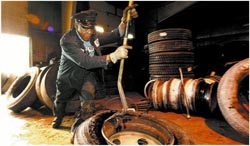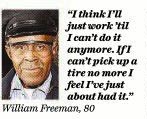February 4, 2007

Fixing 100-pound truck tires at
Valley Tire Co. in Buffalo at age 80 makes William Freeman an icon of
seniors who keep working. Robert
Kirkham/Buffalo News
You wouldn't guess William Freeman is 80, watching him repair
a 100-pound truck tire that comes up to his chest.
He prys the tire off the rim, hooks
it onto a metal claw called a wheel spreader, yanks a nail out with pliers
and presses a patch over the hole.
Then comes the hard part - getting
the tire back on. He positions it over the rim on the floor and jumps on
it. First with his knees, then he bounces up to his feet and jumps some
more. Then he picks up a pry bar.
"Boof!" the tire's lip
snaps over the rim's edge. Quickly he has the wheel up and rolling over to
the compressor to "air up." The needle climbs while he listens
for the crackling sound that means the tire has failed and is about to
explode.
"When you hear it crackle,
stop," he says.

A radio is blaring classic rock
somewhere in the cavernous garage on Buffalo's East Side. By the time the
song ends - it's Bob Seger rasping about getting older - the tire is
fixed.
Retirement isn't for everybody.
Nearly one out of five men over 65 still works for pay, according to U.S.
Census figures, and the practice is growing.
The fraction of men working past 65
ended a long decline in 1985 and began rising again in 1993, climbing to
18.6 percent. Senior women in the work force have hovered at about 10
percent since 1950.
Economists expect the number of
working seniors to continue growing as the 76 million-strong Baby Boom
generation begins to hit retirement age in 2011.
They may continue working, but
they'll have a long way to go to catch up with Freeman, who does a
strenuous job with alacrity and who turns 81 in May.
Freeman has repaired truck tires for
about 50 years for various Buffalo garages. He fixes 30 or 40 tires a day,
sometimes more, earning $11.75 an hour at Valley Tire on
New Babcock Street
, which bought Division Tire, his previous employer, 10 years ago.
He figures the activity keeps him
going, besides providing his livelihood. But if his luck had run the other
way, the work could just as easily have cut his life short, he says
matter-of-factly, "like anything else you do." He's had close
calls in a long career of sliding under disabled trucks and airing up
patched tires.
A direct, plainspoken man in blue
work clothes with "Bill" stitched on his shirt, Freeman moves
quickly around the garage. When he slows down you can see he wears a
hearing aid in each ear, and the hair below his peaked hat is steel gray.
Freeman's endurance in the physically
demanding job is beyond unusual.
"I don't know anyone doing that
kind of work at his age - not even close," said Jack Landgraf,
manager at Valley Tire. Most of Freeman's co-workers switch to desk jobs
in sales or management by their 40s.
But "he enjoys the people - if
he stayed home he would miss it terribly," Landgraf says. "I'm
the same way but I could never do what he does at his age."
People over 40 have a right to stay
on the job as long as they can perform the work, under the U.S. Age
Discrimination in Employment Act. When enacted in 1967 the law protected
workers from mandatory retirement until age 65. The age ceiling was raised
to 70 in 1978, then eliminated in 1986.
There are exceptions for high-level
executives, public safety workers and some regulated jobs like airline
pilots. Even they, however, are getting a new look, as the Federal
Aviation Administration recently proposed to raise pilots' retirement age
to 65, from 60.
Landgraf once asked Freeman if he
thought about retiring. "I'll never ask again," he said.
"He took a little offense. He asked me, "Do you want me to
retire?' "
The answer was "no."
Customers ask for Freeman to work on
their tires because of his experience and the care he takes with expensive
equipment, Landgraf says. He is also a resource, having trained most of
the men with whom he works. Although Freeman isn't a supervisor, Landgraf
says he's not just another technician, either. "He's "The Man'
back there."
Employers' attitudes toward older
workers are mixed. Each year the federal government receives 15,000 to
20,000 age discrimination complaints. In a Buffalo courtroom last week the
U.S. Equal Employment Opportunity Commission fined a Pennsylvania cleaning
products company $50,000 for ousting workers at age 65.
Other employers welcome seniors.
Thirty companies have joined the "National Employer Team" of the
American Association of Retired Persons. The companies - including
CVS
Pharmacies, Toys-R-Us and call center company Client Logic - have programs
to hire and retain workers over 50, what AARP calls mature workers.
At some member companies such as Home
Depot, the work is physically demanding, even strenuous. "A lot of it
will depend on the individual," says Ed Redfern Jr. of AARP's work
force issues group. "There are people in their 50s and 60s who are in
better shape than people in their 20s and 30s."
More employers will see the value in
older workers as waves of experienced and skilled people reach retirement
age, AARP predicts.
Freeman grumbles at limits based on
age, like the idea of restricting drivers' licenses for the elderly. He
says he's never had an accident in 65 years of driving, "and I drive
too," pushing his Saturn well over the speed limit on highway trips,
such as a recent visit to his daughter in Richmond, Va.
"If somebody cuts you off, let
that fool go," he says. "It takes two fools to have an
accident."
But how does he continue wrestling
truck tires when many of his contemporaries are pushing a walker?
Freeman shrugs. He's not a picky
eater; never smoked, goes to church, and drinks moderately on social
occasions. "If there's a party, yeah I'll have a drink, but that's
it," he says, explaining he never developed a taste for alcohol.
Hard as the work is, fixing tires is
a good job compared to some he has done. He left a fractured home at about
age 14 and took all kinds of work - dish washing, whatever was available.
His peaked cap is a holdover from his days driving an independent cab,
taking people home from the market in his car.
In his off hours he likes to work on
his house near
Kensington Avenue
where he lives with Jane Freeman, his wife of 52 years, and his
handicapped son. He makes built-in cabinets and does other remodeling.
He doesn't claim to be Superman.
"When I leave here and go home, that's when it all comes down - legs
hurt, arms hurt, everything hurts when you relax," Freeman says.
"But when I walk back through that door I don't feel a thing."
There are concessions to his age. The
younger guys lend a hand when they see him lifting a heavy tire, and he
doesn't venture out to make roadside repairs anymore. However, he
explains, working indoors means constant activity, with no down-time
driving around. It's just that the conditions are more predictable.
One time he was underneath a
Greyhound on the roadside when two cars collided and came skidding toward
the bus. "I was scared, I knew I was gone," he says. "Two
more feet and they would've hit that bus," knocking it off its
hydraulic jacks.
He says he'll think about retirement
next year, depending how he feels.
"I think I'll just work 'til I
can't do it anymore," he says. "If I can't pick up a tire no
more I feel I've just about had it."
e-mail: fwilliams@buffnews.com
Copyright © Global Action on Aging
Terms of Use |
Privacy Policy | Contact
Us



